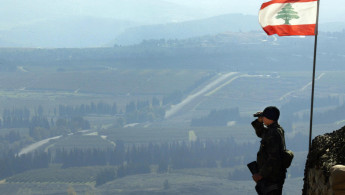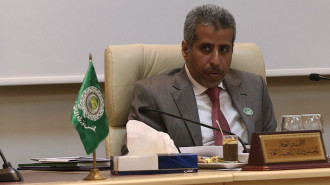Breadcrumb
For the people of southern Lebanon, the war is far from over
For Zeinab Ali Youssef, the war in Lebanon is far from over. Sat on the pavement outside a displacement shelter in Tyre, she waited, as she has done every day for the last year and three months, for the day she can return home in the still-occupied Lebanese far south.
Within minutes of the 60-day ceasefire being announced on Wednesday last week, tens of thousands of Lebanese embarked on a jubilant victory march to their home regions in the east and south. But early enthusiasm over the prospect of peace was soon dampened as a new reality became apparent.
Many found their homes in ruins and their towns left without water, food, or electricity. Meanwhile, the ceasefire, brokered by the US and France, is barely holding.
Israeli attacks continued daily, with France accusing Israel of 52 ceasefire violations in the first four days of the ceasefire. The number now stands over 100 violations.
On Monday, Hezbollah responded, shelling an Israeli position in the occupied Shebaa Farms area.
The residents of the 64 border villages that lie within the Israeli occupation zone are forbidden from returning home at all. Zeinab is one of them.
"Dhayra, Bint Jbeil, Blida … all of them brought to the ground. In Marwahin there isn't a house left standing," Zeinab said, listing the villages still occupied by Israel. She comes from Blida, which is one of a few dozen villages that lie closest to the Israel-Lebanon border.
When she came to talk of her own village her eyes filled with tears. She has seen images on social media of what little remains. "Our whole village has been swept away, even the trees," she said.
Zeinab fled to Tyre after the first exchange of cross-border fire that began on 8 October 2023, when Hezbollah launched rockets at northern Israel in support of Hamas in Gaza.
She remained in Tyre even as the bombs fell all over the ancient city during the two-month Israeli onslaught that began on 23 September, which drove most of the southern population further north.
But since the ceasefire was announced, the shelter in Tyre has been busier than ever, as displaced people returned south only to find themselves displaced once more.
The city is struggling to cope with the sudden influx of arrivals. It has been devastated by airstrikes, one of which destroyed the main water pumping station.
Mortada Mhanna heads Tyre's disaster management unit. His phone was ringing continually. He is coordinating aid and water distribution in the city, while allocating shelters for its residents.
In the space of 20 minutes three families knocked on his office door to tell him their homes had been destroyed.
"The situation is very critical now. A lot of people are coming back to their villages and to Tyre. But there is a lot of damage and destroyed houses, and these families don't have a place to go to. We try to help them … a lot of them are asking if we have place in the shelters, but we have no more places," Mortada said.
In the string of towns and villages skirting the occupation zone, the fragility of the ceasefire is starkly apparent. It is a land of army checkpoints, hollowed-out villages, UN convoys, and the perpetual buzzing of an Israeli MK drone – "Umm Kamel" (mother of Kamel) as it is nicknamed here.
Marjayoun is a picture postcard town. With cobbled streets and rustic, Ottoman-era houses. Perched on a hillside, it overlooks a valley of olive groves, and beyond that the imposing mass of Mount Hermon.
Not for the first time, the mostly Christian town finds itself on the frontline. Despite being on the exclusion list designated by the Israeli military, life has begun to trickle back.
Abou Abbas Assaad was stood outside a market in the main square smoking cigarettes to keep out the cold. He is a farmer from Khiam, a Shia village just south of Marjayoun, but he cannot go back yet. The Israelis are still there, and before the Lebanese army sealed off the entrance to the village, at least four people were injured by Israeli fire in separate incidents.
Besides, Abou Abbas' home is no longer there. He flicked through pictures on his phone showing pancaked layers of cement next to a pile of cinder blocks.
"This was my grandfather's home, more than 120 years ago, then my father took it, then I took it. I was born there; my father was born there…" he said.
The beleaguered Lebanese army has started deploying to the south, with the unenviable task of securing the region and enforcing the terms of the ceasefire, which includes dismantling Hezbollah's weapons and infrastructure.
Citizens in Marjayoun say they feel safer with the army there. But if the ceasefire has brought respite to this area, it has not brought peace.
Five kilometres down the road from Marjayoun is Bourj El Mlouk, another frontier village, cut off from its neighbour Kafr Kila, which is under Israeli control.
There is an uncomfortable quiet in Bourj El Mlouk, as a handful of residents return tentatively to their homes. Faisal Youssef never left. Worried that his home might be used by Hezbollah and become a target for Israeli warplanes, he sent his family to Beirut instead.
"This is what we are facing for the last 20 years. You can ask anybody, Sunni Christian or Druze, they don't want war. I don't think we will make it 60 days I think war will begin after one week or two weeks maximum," Faisal said.
If Faisal doubts the stability of the ceasefire, it is not out of cynicism. On Friday, a shell fired from an Israeli tank hit a house in his village, injuring one person.
Faisal will keep his family at a safe distance in Beirut, for now.
"I want to live in peace. I want my kids to grow up in peace not feeling afraid all the time".







![Anthony Blinken speech [Getty] Anthony Blinken speech [Getty]](/sites/default/files/styles/image_684x385/public/media/images/6263436E-8ACD-4D3C-9055-25A7BE79DD5A.jpg?h=d1cb525d&itok=fLHmHCRG)
 Follow the Middle East's top stories in English at The New Arab on Google News
Follow the Middle East's top stories in English at The New Arab on Google News
![Gaza death toll [Getty]](/sites/default/files/styles/image_330x185/public/2192491071.jpeg?h=a5f2f23a&itok=1V9vL9X5)

![Hajj Saudi Arabia [Getty]](/sites/default/files/styles/image_330x185/public/2157179630.jpeg?h=a5f2f23a&itok=kuo1G9Hw)